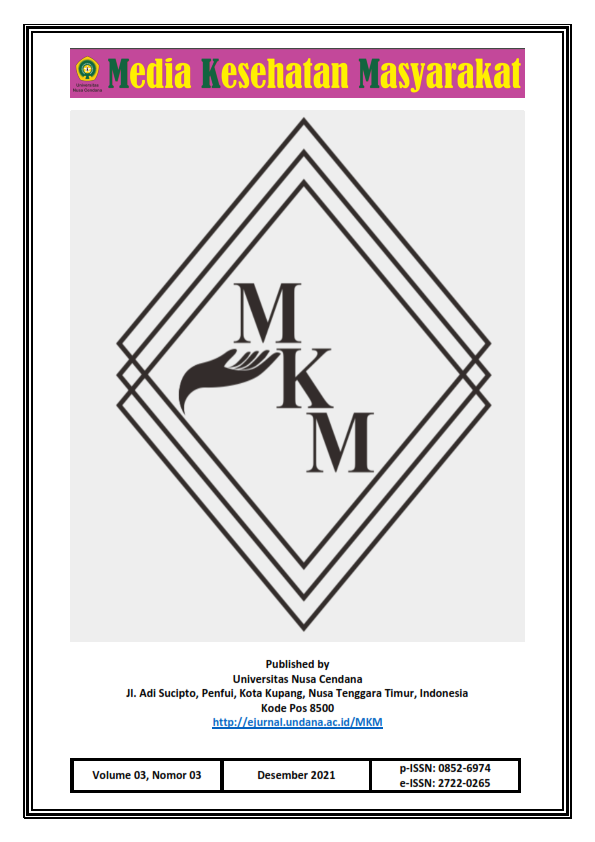Determinan Keberhasilan Pemicuan Stop Buang Air Besar Sembarangan di Wilayah Kerja Puskesmas Busalangga Kecamatan Rote Barat Laut Kabupaten Rote Ndao
Abstract
The behavior of open defecation is still a problem of health behavior in Indonesia. The purpose of this study was to determine and analyze the determinants of successful triggering of open defecation in the working area of Busalangga Public Health Center, Rote Barat Laut District, Rote Ndao Regency in 2020. The type of research used was analytic observational with cross sectional design. The population in this study were all heads of households in the villages of Tualima, Temas, Modosinal and Busalangga who had or had been exposed to the Community-Based Total Sanitation (STBM) program, totaling 1,165 families. The sample in this study were 92 families selected by simple random sampling technique. Methods of data analysis using Chi-Square analysis. The results showed that there was a relationship between knowledge and the success of triggering stopping BABS (p-value=0.004), latrine ownership (p-value=0.005), availability of clean water (p-value=0.023), the role of health workers (p-value=0.014), and support from village officials (p-value=0.044). The success of determining the triggering of stopping open defecation in the working area of the Busalangga Community Health Center is influenced by knowledge, ownership of latrines, availability of clean water, the role of health workers, and the support of good village officials, so it is hoped that the community will continue and continue to improve health behavior related to stopping open defecation so that people can avoid health problems that arise from unhealthy behavior and also people must continue to seek health information to add insight and knowledge.
Downloads
References
Word Health Organization. Progres Sanitasi dan Air Minum-Progres on Sanitation and Drinking-Water. Geneva, editor. WHO 2010; 2014.
Kementerian Kesehatan RI. Peraturan Menteri Kesehatan Nomor 3 Tahun 2014 Tentang Sanitasi Total Berbasis Masyarakat. Kementerian Kesehatan, editor. 2014;1–40. Available from: https://peraturan.bpk.go.id/Home/Details/116706/permenkes-no-3-tahun-2014
Hayana H, Raviola R, Aryani E. Hubungan Cakupan Kepemilikan Jamban di Kelurahan Kampung Baru Kota Pekanbaru. J Kesehat Glob [Internet]. 2020;3(1):9. Available from: http://ejournal.helvetia.ac.id/index.php/jkg/article/view/4536
Amalinda Kris Wijayanti, Laksmono Widagdo ZS. Faktor-Faktor yang Berhubungan dengan Buang Air Besar di Jamban di Desa Gunungsari Kecamatan Pulosari Kabupaten Pemalang. J Kesehat Masy [Internet]. 2016;4(1):450–60. Available from: .neliti.com/media/publications/18455-ID-faktor-faktor-yang-berhubungan-dengan-buang-air-besar-di-jamban-di-desa-gunungsa.pdf
Direktorat Jenderal Kesehatan Masyarakat. Cakupan Sanitasi Indonesia pada tingkat Rumah Tangga per November 2018. In 2018. Available from: http://stbm.kemkes.go.id/review_stbm/findings.html
STBM Indonesia. Monitoring Data. 2018;
Puskesmas Busalangga. Laporan Akses Kemajuan. Laporan Bulanan Puskesmas Busalangga. Rote Ndao; 2019.
Notoatmojo S. Promosi Kesehatan dan Perilaku Kesehatan. Jakarta: Rineka Cipta; 2012.
Dharma. Faktor-Faktor yang Berhubungan dengan Rendahnya Kepemilikan Jamban Keluarga dan Personal Hygiene dengan Kejadian Diare di Desa Sei Musam Kendati Kecamatan Bahorok Kabupaten Langkat Tahun 2014. 2014.
Sitra, E., Agustar, A. & E. Pelaksanaan Program Sanitasi Total Berbasis Masyarakat (STBM) dan Implikasinya Terhadap Perubahan Perilaku Masyarakat di Kabupaten Lima Puluh Kota. Vol. 09. JISPO; 2017. 344-355. p.
Crocker, J., Geremew, A., Atalie, F., Yetie, M. &, Bartram J. Teachers and Sanitation Promotion: An Assessment of Community Led Total Sanitation in Ethiopia. Environ Sci Technol. 2016;50(3):6617–6525.
Nugraha MF. Dampak Program Sanitasi Total Berbasis Masyarakat (STBM) Pilar Pertama di Desa Gucialit Kecamatan Gucialit Kabupaten Lumajang. Kebijak dan Manaj Publik. 2015;3(2):44–53.
Febriani W, Samino, Sari N. Faktor yang Mempengaruhi Perubahan Perilaku Stop Buang Air Besar Sembarangan (BABS): Studi pada Program STBM di Desa Sumbersari Metro Selatan 2016. J Dunia Kesmas [Internet]. 2016;5(3):121–30. Available from: https://core.ac.uk/download/pdf/237009243.pdf
Pitma Pertiwi. Faktor-Faktor Yang Mempengaruhi Pendapatan Tenaga Kerja di Daerah Istimewah Yogyakarta [Internet]. Universitas Negeri Yogyakarta; 2015. Available from: https://eprints.uny.ac.id/21513/1/SKRIPSI_PITMA PERTIWI_11404241038.pdf
Shaluhiyah Z, Widagdo L, Wijayanti A. Faktor-Faktor yang Berhubungan dengan Buang Air Besar di Jamban di Desa Gunungsari Kecamatan Pulosari Kabupaten Pemalang. J Kesehat Masy [Internet]. 2016;4(1):450–60. Available from: .neliti.com/media/publications/18455-ID-faktor-faktor-yang-berhubungan-dengan-buang-air-besar-di-jamban-di-desa-gunungsa.pdf
Apriyanti L, Widjanarko B, Laksono B. Faktor-faktor yang Mempengaruhi Pemanfaatan Jamban Keluarga di Kecamatan Jatibarang Kabupaten Brebes. J Promosi Kesehat Indones [Internet]. 2018;14(1):1. Available from: https://ejournal.undip.ac.id/index.php/jpki/article/view/19900
Solikhah. Hubungan Pelaksanaan ODF (Open Defecation Free) dengan Perubahan Perilaku Masyarakat dalam Buang air Besar diluar Jamban. J Kesehat Masy UAD. 2012;6(2):162–232.
Kementerian Kesehatan RI. Peraturan Menteri Kesehatan Nomor 32 Tahun 2017 Tentang Standar Baku Mutu Kesehatan Lingkungan dan Persyaratan Kesehatan Air Untuk Keperluan Higiene Sanitasi, Kolam Renang, Solus Per Aqua, dan Pemandian Umum. 2017;1–31. Available from: https://peraturan.bpk.go.id/Home/Details/112092/permenkes-no-32-tahun-2017
Kodoatie Robert J SR. Tata Ruang Air. Yogyakarta: Andi Offset; 2010.
Kementerian Kesehatan RI. Undang-Undang Republik Indonesia Nomor 36 Tahun 2014 Tentang Tenaga Kesehatan. 2014;1–78. Available from: https://ipkindonesia.or.id/media/2017/12/UU-No.-36-Th-2014-ttg-Tenaga-Kesehatan.pdf
Keswara UR, Wahyudi DA, Sari WEP. Pengetahuan, Sikap dan Peran Tenaga Kesehatan Terhadap Penerapan Pola Hidup Bersih dan Sehat (PHBS) Rumah Tangga. Holistik J Kesehat [Internet]. 2019;13(1):37–47. Available from: http://ejurnalmalahayati.ac.id/index.php/holistik/article/view/1128/pdf
Kurniawati LD, Windraswara R. Faktor-Faktor yang Berpengaruh terhadap Perilaku Kepala Keluarga dalam Pemanfaatan Jamban di Pemukiman Kampung Nelayan Tambaklorok Semarang. Public Heal Perspect J [Internet]. 2017;2(1):72–9. Available from: https://journal.unnes.ac.id/nju/index.php/phpj/article/download/10997/6676
Proverawati ER. Perilaku hidup bersih dan sehat (PHBS). Cet. 1. Yogyakarta: Nuha Medika; 2012.
Copyright (c) 2021 Author

This work is licensed under a Creative Commons Attribution-ShareAlike 4.0 International License.

 Teni Lesik(1*)
Teni Lesik(1*)














